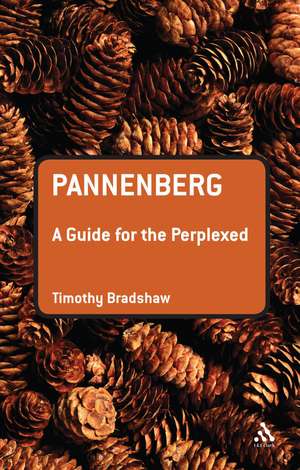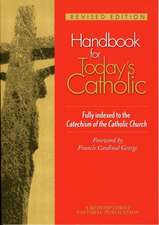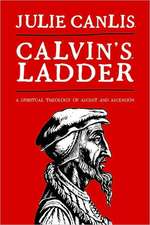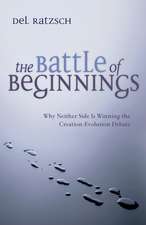Pannenberg: A Guide for the Perplexed: Guides for the Perplexed
Autor Timothy Bradshawen Limba Engleză Paperback – 29 iun 2009
| Toate formatele și edițiile | Preț | Express |
|---|---|---|
| Paperback (1) | 169.70 lei 6-8 săpt. | |
| Bloomsbury Publishing – 29 iun 2009 | 169.70 lei 6-8 săpt. | |
| Hardback (1) | 766.83 lei 6-8 săpt. | |
| Bloomsbury Publishing – 29 iun 2009 | 766.83 lei 6-8 săpt. |
Din seria Guides for the Perplexed
- 15%
 Preț: 163.72 lei
Preț: 163.72 lei - 15%
 Preț: 162.39 lei
Preț: 162.39 lei - 14%
 Preț: 178.06 lei
Preț: 178.06 lei -
 Preț: 144.26 lei
Preț: 144.26 lei - 14%
 Preț: 132.38 lei
Preț: 132.38 lei -
 Preț: 165.84 lei
Preț: 165.84 lei - 15%
 Preț: 169.50 lei
Preț: 169.50 lei - 24%
 Preț: 149.61 lei
Preț: 149.61 lei - 9%
 Preț: 145.06 lei
Preț: 145.06 lei - 16%
 Preț: 148.75 lei
Preț: 148.75 lei - 15%
 Preț: 162.06 lei
Preț: 162.06 lei - 15%
 Preț: 164.06 lei
Preț: 164.06 lei - 9%
 Preț: 156.84 lei
Preț: 156.84 lei - 15%
 Preț: 163.97 lei
Preț: 163.97 lei - 15%
 Preț: 163.79 lei
Preț: 163.79 lei - 22%
 Preț: 163.37 lei
Preț: 163.37 lei - 9%
 Preț: 155.99 lei
Preț: 155.99 lei - 15%
 Preț: 162.03 lei
Preț: 162.03 lei - 22%
 Preț: 562.30 lei
Preț: 562.30 lei - 14%
 Preț: 254.99 lei
Preț: 254.99 lei - 15%
 Preț: 162.91 lei
Preț: 162.91 lei - 19%
 Preț: 157.98 lei
Preț: 157.98 lei - 20%
 Preț: 169.25 lei
Preț: 169.25 lei - 22%
 Preț: 592.22 lei
Preț: 592.22 lei -
 Preț: 214.07 lei
Preț: 214.07 lei - 22%
 Preț: 708.54 lei
Preț: 708.54 lei - 15%
 Preț: 163.16 lei
Preț: 163.16 lei - 14%
 Preț: 163.79 lei
Preț: 163.79 lei - 14%
 Preț: 144.26 lei
Preț: 144.26 lei - 15%
 Preț: 143.99 lei
Preț: 143.99 lei - 22%
 Preț: 591.90 lei
Preț: 591.90 lei - 20%
 Preț: 189.41 lei
Preț: 189.41 lei - 15%
 Preț: 175.23 lei
Preț: 175.23 lei - 15%
 Preț: 162.11 lei
Preț: 162.11 lei - 22%
 Preț: 563.90 lei
Preț: 563.90 lei - 20%
 Preț: 176.74 lei
Preț: 176.74 lei - 23%
 Preț: 766.42 lei
Preț: 766.42 lei - 15%
 Preț: 162.99 lei
Preț: 162.99 lei - 23%
 Preț: 941.42 lei
Preț: 941.42 lei - 14%
 Preț: 144.17 lei
Preț: 144.17 lei - 21%
 Preț: 175.23 lei
Preț: 175.23 lei - 14%
 Preț: 591.75 lei
Preț: 591.75 lei
Preț: 169.70 lei
Preț vechi: 210.85 lei
-20% Nou
Puncte Express: 255
Preț estimativ în valută:
32.48€ • 33.85$ • 27.04£
32.48€ • 33.85$ • 27.04£
Carte tipărită la comandă
Livrare economică 06-20 ianuarie 25
Preluare comenzi: 021 569.72.76
Specificații
ISBN-13: 9780567032560
ISBN-10: 0567032566
Pagini: 200
Dimensiuni: 138 x 216 x 15 mm
Greutate: 0.26 kg
Editura: Bloomsbury Publishing
Colecția T&T Clark
Seria Guides for the Perplexed
Locul publicării:London, United Kingdom
ISBN-10: 0567032566
Pagini: 200
Dimensiuni: 138 x 216 x 15 mm
Greutate: 0.26 kg
Editura: Bloomsbury Publishing
Colecția T&T Clark
Seria Guides for the Perplexed
Locul publicării:London, United Kingdom
Caracteristici
An ideal upper-level introduction to one of the most challenging contemporary theologians.
Cuprins
CONTENTS Introduction Background, education and influences, historical, philosophical and theological Chapter 1 Human Orientation in History Focused text: Basic Questions in Theology 1 & 2 1. Reasonable Faith 2. What is Truth? 3. The historical structure of human life experience 4. Raising the Question of God 5. Conclusion Chapter 2 Revelation as History Focused text: Revelation as History 1. Indirect Self Revelation 2. Dogmatic Theses on the Doctrine of Revelation 3. Overview of Pannenberg's doctrine of revelation 4. Truth and Concepts of God 5. Religions and Revelation 6. Trinitarian Conclusion Chapter 3 Jesus' Eschatological Identity Focused text: Jesus God and Man 1. Pannenberg's eschatological historicist approach 2. Christology from Below 3. Jesus' revelatory resurrection 4. Jesus' revelational unity of essence with God 5. Retroactive force of Easter for Jesus' pre-Easter identity 6. The unity and distinction of Jesus with his Father - reciprocal self dedication 7. Jesus the man before God 8. Jesus' vicarious death on the cross 9. The Divinity of Christ and the Man Jesus 10. Conclusion: Three Levels Chapter 4 Historicist Trinitarian Ontology Focused text: Grundfragen Systematischer Theologie Band 2 1. The Trinitarian Spirit 2. The Trinitarian God of History 3. Trinitarian Personhood - beyond subjectivity and substance 4. The Trinitarian Life of the Future Perfect Chapter 5 Creation and Human Becomings Focused text What is Man? 1. Open Textured Creation 2. What is Man? Openness and Closedness 3. Imago Dei 4. The Spirit in and of Humanity 5. Alienation 6. Human Construction of Reality 7. Conclusion - anti Post Modern? Chapter 6 Concluding with the End 1. The Creative End 2. Being Eternity and Time 3. Conclusion The Future Perfected
Recenzii
'Tim Bradhsaw offers us here the best introduction to Pannenberg available in English. More than this, his book is also a trenchant defence of Pannenberg's Hegelian reconstruction of Christianity. Whether or not the reader is convinced, there is no doubt about the strength and clarity of the argument.' - Lewis Ayres, Department of Theology and Religion, Durham University, UK.
'Dr Bradshaw offers us a thorough, lucid and reliable guide to the theology of Wolfhart Pannenberg, in a way that should surely bring illumination to the perplexed reader. He patiently builds up the whole picture of Pannenberg's thought by way of a close reading of texts, beginning from Pannenberg's early work on revelation as history, through his magisterial work on Christology, to his mature account of Trinity, concluding with a final vision of human destiny in resurrection from the dead. Bradshaw's method in the 'story' of the book echoes Pannenberg's own theory of knowledge, that new horizons of understanding open up as history proceeds and new insights arrive from the future, that past events take on new meaning as more of history unfolds, and that only from the end or the 'whole' can the path of history be properly understood. It is the remarkable achievement of this guide to have a similar forward momentum that carries the reader on to the end. Bradshaw is taking the reader on a journey of understanding through careful exposition which is widely accessible and only occasionally technical. This developmental approach seems to reflect the spirit of Hegel, whom Bradshaw argues is in fact the constant companion of Pannenberg. An original feature of this guide is the way Bradshaw exposes a much greater debt to Hegel in Pannenberg than is usually recognized, while judiciously pointing out his differences from the earlier thinker. With regard to Trinity, for example, Bradshaw shows how Pannenberg adopts Hegel's vision of reciprocal self-distinction of the persons, while avoiding his absolute subjectivity. He also shows how Pannenberg is strongly influenced by a Hegelian account of divine self-revelation through the processes of history, while at the same time insisting on the freedom of God as the God of the future. As Bradshaw neatly puts it, Pannenberg wants to 'out-Hegel Hegel'. In showing how Pannenberg thus evades any neat labelling, Bradshaw also situates him in relation to such diverse thinkers as Barth, Scheliermacher, Jacques Derrida and the feminist writer bell hooks. Notably, Bradshaw shows successfully that Pannenberg conforms neither to Enlightenment nor postmodern expectations. On the one hand, theology cannot base itself on assertions which are not subject to critical questioning by reason. But on the other hand revelation is also basic to theology, and there can be no 'God-free zone' in either history or science. While postmodernist thinkers might regard Pannenberg as an unreformed Enlightenment thinker, he insists on the provisionality of all theology until the end, and the openness of history to expanding meaning and all things new. It is an irony, Bradshaw thinks, that this openness to the future seems to be somewhat suppressed by Pannenberg's stress on simultaneity of time in the eschatological destiny of human beings. Nevertheless, Pannenberg emerges from this engaging and perceptive review as a thinker shaped by German idealism, but one who supplants the model of mind with relations of mutual love at the heart of reality in which we are invited to participate for ever. I strongly commend this book. Those who know Pannenberg will see new angles on his thought, and those who do not will be enticed into reading him.' - Paul S. Fiddes, Regent's Park College, Oxford, UK
It requires the pen of Pannenberg himself to show...the meaningfulness of history. But Bradshaw guides us securely." Church Times, February 2010.
'Bradshaw's book will benefit students of Pannenberg and provide a valuable starting point for engagement with this prominent figure of modern theology.'
This fine introduction to Pannenberg's theology navigates Pannenberg's views of God, history, Christology, and ontology in accessible language for those uninitiated into his thinking... Pannenberg is not a thinker quickly mastered. Bradshaw indeed helps the "perplexed" by walking the neophyte through complex philosophical vocabulary and concepts. His text is to be recommended for students of Pannenberg's thought or contemporary theology in general.
'Timothy Bradshaw offers a lucid and reliable exposition of the range of Pannenberg's theology; his book will serve as an excellent guide to the work of one of the most eminent modern Christian minds.' - John Webster, King's College, Aberdeen, Scotland
The description that Bradshaw offers of Pannenberg is lucid, the material divided logicallyand the content reliable... The value of the book is enhanced by a thorough bibliography and an index ofnames and subjects discussed in the book. Bradshaw gives us a helpful insight intoPannenberg's theology and helps us to appreciate his importance for our present daytheological understanding.
'Dr Bradshaw offers us a thorough, lucid and reliable guide to the theology of Wolfhart Pannenberg, in a way that should surely bring illumination to the perplexed reader. He patiently builds up the whole picture of Pannenberg's thought by way of a close reading of texts, beginning from Pannenberg's early work on revelation as history, through his magisterial work on Christology, to his mature account of Trinity, concluding with a final vision of human destiny in resurrection from the dead. Bradshaw's method in the 'story' of the book echoes Pannenberg's own theory of knowledge, that new horizons of understanding open up as history proceeds and new insights arrive from the future, that past events take on new meaning as more of history unfolds, and that only from the end or the 'whole' can the path of history be properly understood. It is the remarkable achievement of this guide to have a similar forward momentum that carries the reader on to the end. Bradshaw is taking the reader on a journey of understanding through careful exposition which is widely accessible and only occasionally technical. This developmental approach seems to reflect the spirit of Hegel, whom Bradshaw argues is in fact the constant companion of Pannenberg. An original feature of this guide is the way Bradshaw exposes a much greater debt to Hegel in Pannenberg than is usually recognized, while judiciously pointing out his differences from the earlier thinker. With regard to Trinity, for example, Bradshaw shows how Pannenberg adopts Hegel's vision of reciprocal self-distinction of the persons, while avoiding his absolute subjectivity. He also shows how Pannenberg is strongly influenced by a Hegelian account of divine self-revelation through the processes of history, while at the same time insisting on the freedom of God as the God of the future. As Bradshaw neatly puts it, Pannenberg wants to 'out-Hegel Hegel'. In showing how Pannenberg thus evades any neat labelling, Bradshaw also situates him in relation to such diverse thinkers as Barth, Scheliermacher, Jacques Derrida and the feminist writer bell hooks. Notably, Bradshaw shows successfully that Pannenberg conforms neither to Enlightenment nor postmodern expectations. On the one hand, theology cannot base itself on assertions which are not subject to critical questioning by reason. But on the other hand revelation is also basic to theology, and there can be no 'God-free zone' in either history or science. While postmodernist thinkers might regard Pannenberg as an unreformed Enlightenment thinker, he insists on the provisionality of all theology until the end, and the openness of history to expanding meaning and all things new. It is an irony, Bradshaw thinks, that this openness to the future seems to be somewhat suppressed by Pannenberg's stress on simultaneity of time in the eschatological destiny of human beings. Nevertheless, Pannenberg emerges from this engaging and perceptive review as a thinker shaped by German idealism, but one who supplants the model of mind with relations of mutual love at the heart of reality in which we are invited to participate for ever. I strongly commend this book. Those who know Pannenberg will see new angles on his thought, and those who do not will be enticed into reading him.' - Paul S. Fiddes, Regent's Park College, Oxford, UK
It requires the pen of Pannenberg himself to show...the meaningfulness of history. But Bradshaw guides us securely." Church Times, February 2010.
'Bradshaw's book will benefit students of Pannenberg and provide a valuable starting point for engagement with this prominent figure of modern theology.'
This fine introduction to Pannenberg's theology navigates Pannenberg's views of God, history, Christology, and ontology in accessible language for those uninitiated into his thinking... Pannenberg is not a thinker quickly mastered. Bradshaw indeed helps the "perplexed" by walking the neophyte through complex philosophical vocabulary and concepts. His text is to be recommended for students of Pannenberg's thought or contemporary theology in general.
'Timothy Bradshaw offers a lucid and reliable exposition of the range of Pannenberg's theology; his book will serve as an excellent guide to the work of one of the most eminent modern Christian minds.' - John Webster, King's College, Aberdeen, Scotland
The description that Bradshaw offers of Pannenberg is lucid, the material divided logicallyand the content reliable... The value of the book is enhanced by a thorough bibliography and an index ofnames and subjects discussed in the book. Bradshaw gives us a helpful insight intoPannenberg's theology and helps us to appreciate his importance for our present daytheological understanding.











